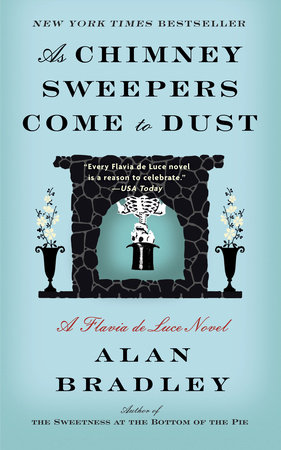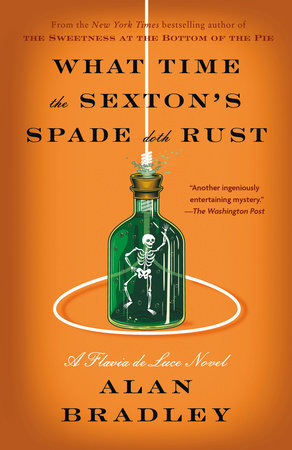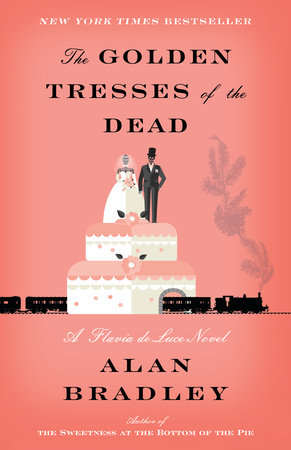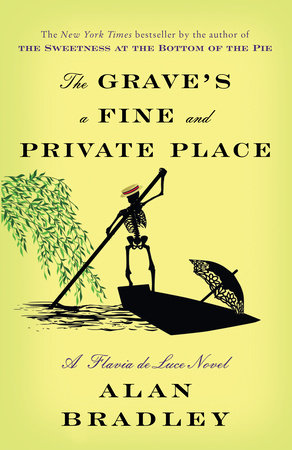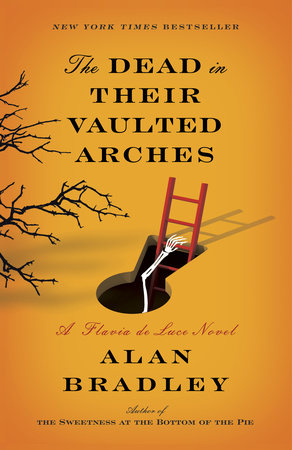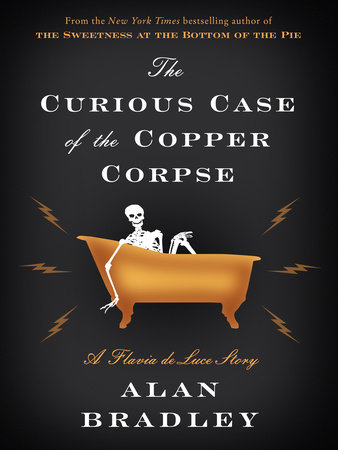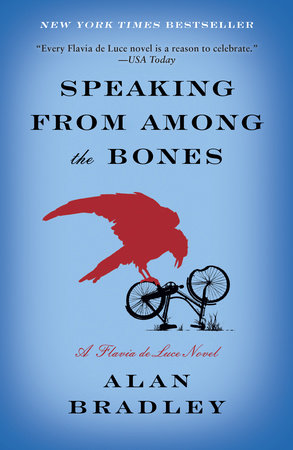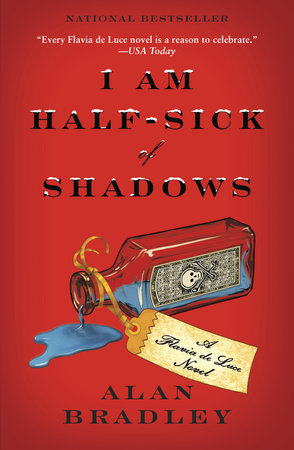Excerpt
As Chimney Sweepers Come to Dust
ONE
“Banished!” the wild wind shrieked as it tore at my face.
“Banished!” the savage waves roared as they drenched me with freezing water.
“Banished!” they howled. “Banished!”
There is no sadder word in the English language. The very sound of it—-like echoing iron gates crashing closed behind you; like steel bolts being shot shut—-makes your hair stand on end, doesn’t it?
“Banished!”
I shouted the word into the tearing wind, and the wind spat it back into my face.
“Banished!”
I was standing at the heaving prow of the R.M.S. Scythia, my jaws wide open to the gale, hoping that the salt spray would wash the bad taste out of my mouth: the taste that was my life so far.
Somewhere, a thousand miles behind us over the eastern horizon, lay the village of Bishop’s Lacey and Buckshaw, my former home, where my father, Colonel Haviland de Luce, and my sisters, Ophelia and Daphne, were most likely, at this very moment, getting on nicely with their lives as if I had never existed.
They had already forgotten me. I was sure of it.
Only the faithful family retainers, Dogger and Mrs. Mullet, would have shed a furtive tear at my departure, but even so, they, too, in time, would have only foggy memories of Flavia.
Out here on the wild Atlantic, the Scythia’s bow was hauling itself up . . . and up . . . and up out of the sea, climbing sickeningly toward the sky, then crashing down with a horrendous hollow booming, throwing out great white wings of water to port and starboard. It was like riding bareback on an enormous steel angel doing the breaststroke.
Although it was still early September, the sea was madness. We had encountered the remnants of a tropical hurricane, and now, for more than two days, had been tossed about like a cast--off cork.
Everyone except the captain and I—-or so it seemed—-had dragged themselves off to their bunks, so that the only sounds to be heard as one reeled along the pitching, rolling corridors to dinner were the groan of stressed steel and, behind closed doors on either side, the evacuation of scores of stomachs. With nearly nine hundred passengers on board, it was a sobering sound.
As for me, I seem to be blessed with a natural immunity to the tossing seas: the result, I supposed, of seafaring ancestors such as Thaddeus de Luce, who, although only a lad at the Battle of Trafalgar, was said to have brought lemonade to the dying Admiral Nelson, and to have held his cold and clammy hand.
Nelson’s last words, actually, were not the widely reported “Kiss me, Hardy,” addressed to Captain Thomas Hardy of the Victory, but rather, “Drink, drink . . . fan, fan . . . rub, rub,” whispered feverishly to the wide--eyed young Thaddeus, who, although reduced to tears at the sight of his mortally wounded hero, was doing his best to keep the great man’s circulation from crystallizing.
The wind ripped at my hair and tore at my thin autumn coat. I inhaled the salt air as deeply as I dared, the sea spray running in torrents down my face.
A hand seized my arm roughly.
“What the devil do you think you’re doing?”
I spun round, startled, trying to wriggle free.
It was, of course, Ryerson Rainsmith.
“What the devil do you think you’re doing?” he repeated. He was one of those people who thought that the secret of gaining the upper hand was to ask every question twice.
The best way of dealing with them is not to answer.
“I’ve been looking everywhere for you. Dorsey is beside herself with worry.”
“Does that mean there are now two of her to put up with?” I wanted to ask, but I didn’t.
With a name like Dorsey it was no wonder he called her “Dodo”—-or at least he did whenever he thought they were alone.
“We were afraid you’d fallen overboard. Now come below at once. Go to your cabin and put on some dry clothing. You look like a drowned rat.”
That did it. It was the last straw.
Ryerson Rainsmith, I thought, your days—-your very hours—-are numbered.
I would go to the young and handsome ship’s doctor, whom I had met at supper the night before last. On the pretext of an upset tummy I would beg a bottle of sodium bicarbonate. A healthy dose of the stuff—-I smiled at the word “healthy”—-slipped into Rainsmith’s invariable bottle of champagne would do the trick.
Taken on a full stomach—-no worries about that where Ryerson Rainsmith was concerned!—-sodium bicarbonate combined with effervescent alcohol could be deadly: first, the headache, which seemed to grow by the minute, followed by mental confusion and severe stomach pain; then the muscle weakness, the thin stools like coffee grounds, the tremors, the twitching: all the classic symptoms of alkalosis. I would insist on taking him out on deck for a healthy walk. Forcing him to hyperventilate in all this fresh, invigorating air would speed up the process—-like sloshing petrol onto a fire.
If I could manage to raise the pH of his arterial blood to 7.65, he wouldn’t stand the chance of a snowman in Hades. He would die in agony.
“I’m coming,” I said sullenly, and followed him at the speed of a sleepy snail, aft across the rolling, pitching foredeck.
Hard to imagine, I thought, that I had actually been handed over to this rancid slab of humanity. Hard to forget, though, how it had come about.
It had all begun with that awful business about my mother, Harriet. After ten years of being missing in the mountains of Tibet, Harriet had returned to Buckshaw in circumstances so painful that my brain was still forbidding me to think about them for more than a few seconds at a time; any longer than that, and my internal censor snipped my thread of memory as easily as Atropos, that dreaded third sister of the Fates, is said to snip the thread of life with her scissors when our time has come to die.
The upshot of it all was that I was to be packed off to Miss Bodycote’s Female Academy, Harriet’s old school in Canada, where I was to be trained to assume some ancient and hereditary role of which I was still kept mostly in ignorance.
“You shall simply have to learn your way into it,” Aunt Felicity had told me. “But in time you shall come to realize that Duty is the best and wisest of all teachers.”
I wasn’t quite sure what she meant by that, but since my aunt was rather high up in this mysterious whatever--it--was, she was not to be argued with.
“It’s something like ‘The Firm,’ isn’t it?” I asked. “The nickname that the Royal Family call themselves.”
“Somewhat,” Aunt Felicity said, “but with this difference: Royalty is permitted to abdicate. We are not.”
It had been at Aunt Felicity’s insistence that I was packed up like a bundle of old rags and tossed onto a ship to Canada.
There had been protests, of course, at my going alone, notably from the vicar and his wife. Then there had been some talk about having Feely and her fiancé, Dieter Schrantz, accompany me on my transatlantic journey, but that idea was scotched on the grounds not only that it would be improper, but also that Feely’s position as organist at St. Tancred’s was classified as an essential service.
At that point Cynthia Richardson, the vicar’s wife, threw her own name into the hat. Although Cynthia and I had had our ups and downs, we had recently become great pals, an unexpected twist in my life I was still finding hard to believe. Away from her husband, Cynthia was brimming with fun: a girl again, in spite of herself. The vicar would have been horrified at the amount of tea the two of us sprayed out in hysterical laughter upon the slate floor of the vicarage kitchen.
But then, alas, Cynthia’s name, too, was taken out of the running. Like Feely, she was too important to be released. Without her, there would be no church calendar, no church bulletins, no flowers for the altar, no home visits, no Girl Guides, no clean cassocks and surplices, no meals for the vicar . . . the list went on and on.
I knew she was disappointed: She told me so.
“I should have liked to see Canada,” she told me. “My father, as a young man, worked as a log driver—-a river pig—-on the Ottawa River. Instead of fairy tales at bedtime, he used to tell me horrific stories of the loup--garou—-the werewolf of the Canadian woods—-and of how he once gave a good dunking to Ole Bull and Big Jacques Laroque in the log--rolling contest at the Rapides des Allumettes, both on the same morning.
“I had always hoped that I would one day be able to lace on a pair of spiked logger’s boots and have a go at it myself,” she added wistfully. “Now I suppose I shan’t have a chance.”
I could have wept at the sight of her sitting there at the vicarage kitchen table, her eyes staring damply into her past.
“The Altar Guild is likely just as dangerous,” I said brightly, hoping to cheer her up, but I don’t think she heard me.
That same afternoon, Aunt Felicity announced that the problem was solved: She had heard from Miss Bodycote’s Female Academy that the chairman of the academy’s board of guardians, who had been summering in England, would be setting sail for home in September.
He had been shooting for a few days with one of our neighbors, Lord Crowsborough, and it would be no trouble at all, he said, to drop by and pick me up—-as if I were an empty milk bottle.
I shall never forget the day that he arrived at Buckshaw—-an hour and a half late, I might add—-in his borrowed Bentley. He had leapt from the car and dashed round to the offside to open the door for Dorsey, the queen of Sheba, who unfolded herself from the machine like a stork from an eggshell and stood blinking in the September sunshine as if she had just been startled awake from a hypnotic trance. She was wrapped in a dress of turquoise silk, with a matching scarf on her head and far too much magenta lipstick on her mouth. Need I say more?
“Oh, Ryerson,” she cooed, gazing at our ancestral home. “It’s all so quaint—-so tumble--de--dump. Just as you said it would be.”
Ryerson Rainsmith, in a summer suit the color of cold coffee and curdled cream, stood looking round in a self--satisfied manner with his thumbs tucked into his yellow waistcoat, drumming his fingers on his ample stomach. I was reminded of a partridge.
Father, who had gone to the front door to greet him, stepped out onto the gravel sweep and shook hands.
“Colonel de Luce, I presume,” Rainsmith said, as if he had just solved some great mystery. “I’d like you to say hello to my wife, Dorsey. Come and shake hands with the squire, my dear. It’s not every day you’ll get such an opportunity.
“Ha ha ha,” he added mirthlessly. “And this must be our little Flavia!”
On paper, the man was already dead.
“Mr. Rainsmith,” he said, shoving a damp hand into my face.
Dogger had once warned me to be wary of any man who introduced himself as “Mr.” It was an honorific, he said, a mark of respect to be bestowed by others, but never, ever, under any circumstances, upon oneself.
I ignored the extended hand.
“Howdy,” I said.
Father stiffened. His eyes narrowed. I knew what was going on in his head.
My father was from an era when gentlemen were taught that politeness was everything, that the only sure way to lose out to the Philistines was to lose your temper and admit that they had wounded you. His years in a Japanese prisoner--of--war camp had perfected his ability to remain, in the face of insult, as silent as a standing stone.
“Please come in,” he said, gesturing to the open door. I wanted to give him a swift kick in the trousers and at the same time I wanted to hug him. Pride in a parent often takes strange forms.
“What a quaint old hall!” Dorsey Rainsmith said. Her voice was as sharp as elderly cheese and her words echoed back unpleasantly from the dark paneling of the foyer. “We have the same trouble with cracking varnish in our salon back home in Toronto, don’t we, Ryerson? Smithers, our handy-man, says it’s from either excessive heat or excessive cold.”
“Or age,” I suggested.
Father pierced me with a transparent look, but I knew what he meant.
In the drawing room, without being asked, the Rainsmiths subsided into the coziest seats, while Father and I perched on the edge of the remaining chairs.
After an interval timed to perfection, Dogger appeared and offered tea. I could see that the Rainsmiths were impressed.
“Thank you, Dogger,” I said. “And please convey our thanks to Mrs. Mullet.”
It was a game Dogger and I played: a game with rules so subtle that no one outside our immediate family could ever hope to grasp them.
“Not at all, Miss Flavia,” Dogger said. “It is our very great pleasure to be of service.”
“Yes, thank you, Dogger,” Ryerson Rainsmith said, out of his depth but paddling madly to keep his head above water.
“And also your Mrs. Mullet,” his wife added.
Dogger gave them a three--percent smile and vanished in the way he does.
After a while, Daffy and Feely came into the room, pretended to be bereft at the thought of losing me, chatted in a maddeningly polite fashion with the Rainsmiths, then drifted off to their respective books and looking glass.
But there’s no sense in raking through the ashes of that dismal afternoon.
It was decreed that the Rainsmiths would be my chaperones on the voyage to Canada, where they would deliver me up safely to the doorstep of Miss Bodycote’s Female Academy.
“Chaperones?” Daffy said when they were gone. “ ‘Cicerones,’ you mean. That’s the proper word for it. Flavia on the Grand Tour—-just think! I hope you appreciate it, you lucky chump. I’d give anything to be in your plimsolls.”
I threw a handy tennis racket at her, but I missed.
***
I missed Daffy in a very different way as I trudged up the sloping deck in the footsteps of Ryerson Rainsmith. Daffy, at least, was my own flesh and blood and could be defied without permanent damage. Ryerson Rainsmith, by contrast, would remember this moment for as long as he lived. He would still be telling his putrid grandchildren about it when he was no more than a shriveled pudding in a wheelchair.
“And there she was—-there I found her,” he would tell them in a cracked, quavering voice, “standing on the first six inches of the ship’s bow with the waves breaking over her head.”
He spoke not a word until we were belowdecks, tottering like walking toys along the heaving passageway toward the Rainsmiths’ stateroom. He had obviously forgotten ordering me to change into dry clothing. Or perhaps he had decided to deliver me up damp to his wife.
“Take my advice,” he said in a conspiratorial whisper, as if we were suddenly old pals. “Don’t rile her.”
He rapped at the door with his knuckles before opening it and motioning me to go ahead of him.
By the way Dorsey Rainsmith looked at me, I might have been a cobra shoved into her face.
“Look at you!” she said. “Just look at you!”
It is an order often given to girls of my age with little thought given to how difficult it is to carry out, actually.
I crossed my eyes very slightly, but if she noticed, it went over her head.
“Where have you been?” she demanded.
“On deck,” I said.
“Why?”
“Fresh air.”
“You might have fallen overboard. Did you never think of that?”
“No,” I said truthfully. I might also have been hit on the noggin and killed by a falling albatross, but I didn’t say so.
What was it about this woman that grated so violently on my nerves? I’m generally a very tolerant sort of person, but there was something about Dorsey Rainsmith that rubbed me in the wrong direction.
I think it was the way in which she reduced her husband to less than a comma.
There is a word my sister Daffy uses whenever she wishes to be particularly cutting: “obsequious.” It might have been coined expressly to describe the behavior of Ryerson Rainsmith whenever he was in the presence of his wife: fawning and cringing to the point of nausea.
I looked at him standing at the door of the stateroom as if in fear of her, almost afraid to come in. He had delivered me up to her in the way a cat presents a dead bird to its owner. He was waiting for a pat on the head—-or perhaps a bowl of cream.
But he didn’t get one.
“What are we going to do with you?” Dorsey sighed, as if the weight of the entire British Empire were upon her shoulders.
I did what I was expected to do: I shrugged.
“Dr. Rainsmith is very disappointed with you,” she said, as if he weren’t in the room. “And Dr. Rainsmith cannot tolerate being disappointed.”
Dr. Rainsmith? He had introduced himself as Mr. As chairman of the board of guardians at Miss Bodycote’s, he must be a doctor of education, or maybe of theology. Well, I certainly wasn’t going to address him by any fancy titles.
“Go to your cabin and change into dry clothing. And stay there until you are sent for.”
Go to your room. The classic response of someone who is fresh out of ideas.
Checkmate! Hallelujah! Game, set, and match!
I had won.
Next morning, I was standing on the railings at the starboard bow, waving my hat into the wind and singing “A Life On the Ocean Wave” to cheer myself up, when, from the corner of my eye, I noticed Ryerson Rainsmith. The instant he spotted me, he sheared off and went astern.
Which pretty well set the tone for the rest of the voyage.
A couple of days later, as we approached the harbor at Halifax, Dorsey told me to wipe my nose. That was my first glimpse of the New World.
At Quebec City, we disembarked. A Canadian customs officer in black suit and cap asked me the purpose of my visit.
“Penal colony,” I told him. He raised his eyebrows, gave the Rainsmiths a sympathetic shake of his head, and stamped my passport.
Only then—-at that very instant—-did I realize how far from home I was. Alone in a foreign country.
Unaccountably, I burst into tears.
“There, there,” said Ryerson Rainsmith, looking not at me, but rather at the customs officer. The words came out as “They--ahh, they--ahh,” and I realized, in spite of my tears, that the farther west we traveled, the more pronounced his fake English accent was becoming.
“The little English girl is homesick,” the customs officer said, kneeling down and dabbing at my eyes with an enormous white handkerchief.
No great detective work there: He had already examined our passports and knew that I was not their child.
What was he up to, then? Was this close--up inspection part of his routine search for contraband?
For just an instant I flirted with the idea of faking a faint, then calling aloud for a restorative shot from one of the six bottles of Gordon’s Gin that—-among other things—-were hidden under the false bottom of the Rainsmiths’ steamer trunk.
Don’t ask me how I know that: There are a few things in my life of which I am still not proud.
“Chin up!” the customs officer said, lifting my face with a folded finger and looking into my eyes. He smiled at the Rainsmiths. “I have one just like her at home.”
Somehow I doubted it, but I forced a weak grin.
But what an inane remark! Even if he had a hundred daughters at home crying into a hundred silken handkerchiefs, what did I care? How could it possibly matter?
One of the things I dread about becoming an adult is that sooner or later you begin letting sentimentality get in the way of simple logic. False feelings are allowed to clog the works like raw honey poured into the tiny wheels of a fine timepiece.
I have observed this again and again in adults with whom I am acquainted. When all else failed, a good old cry was guaranteed to get them off the hook. It was not just instinct: No, it was more than that. It was something to do with the oleaginous chemical essences given off by a crying human: some supersensor in the nose designed to detect the altered hormone and protein levels in the emotional weeping of humans—-and of the human female, in particular.
I had been thinking of producing a paper on this fascinating subject—-Tears and the Test Tube—-but had been forced to shelve the idea when I was flung, without ceremony, out of my ancestral home. The very thought of being cut off from my late uncle Tarquin’s splendid chemical laboratory, with its gleaming glassware, its lovely old Leitz microscope, its rows upon rows of bottled chemicals and pretty poisons, was enough to reduce me to tears again, so that I was right back where I started.
It had been in that quiet room, by the light of its tall casement windows, that, with the assistance of Uncle Tar’s notebooks and library, I had taught myself chemistry, and by so doing had set myself apart forever from the rest of the human race.
No matter that I had been a mere child when I began. I was now twelve, and remarkably proficient in juggling what Uncle Tar had once called “the crumbs of the universe.”
“I’m sorry,” I said. “I was overcome. Forgive me.”
The trance was broken. The moment had passed and we were back again in the cold, cold world.
The customs officer got to his feet, and looked hastily round to see that no one had observed his momentary weakness.
“Next!” he shouted as he scratched his chalk mark on our luggage.
As Ryerson Rainsmith queued for tickets in the railway booking office, I helped myself to a map and timetable from a handy rack. The distance from Quebec City to Toronto, I saw, was five hundred miles: more than half the distance from Land’s End to John o’Groats.
It was going to take about nine hours, and we would not arrive in Toronto until late—-eleven o’clock in the evening.
Dorsey Rainsmith had fortified herself with a paperback novel from the news agent’s kiosk: Vengeance Is Mine, by Mickey Spillane. She tried to conceal it in a folded copy of the Montreal Gazette, but not before I had a chance to see the cover illustration: a man in trench coat and floppy hat lugging in his arms what appeared to be a dead blonde, whose white silk dress was rucked up to somewhere in the neighborhood of her tonsils.
I recognized the title as a quotation from the Bible: a quotation I had several times mulled over myself as I planned various schemes to teach my sisters a lesson. Slashed across the book’s cover were adverts for other volumes by the same author, such as I, the Jury and My Gun Is Quick.
There was something vaguely but deeply satisfying about these titles, but I couldn’t quite put my finger on it.
“All aboard!” the conductor shouted.
I was learning quickly. Back home in England, trains had guards while buses and trams had conductors. Here in Canada, the guard was a conductor, and the carriages, called cars, were built with seats on both sides of a center aisle, rather than having compartments, each of which opened directly onto the platform.
It was like falling asleep and awakening as Alice in Through the Looking--Glass. Everything was larger than life and everyone drove on the wrong side of the road.
One could easily see why they called it the “New World.”
At last, the train jolted into motion and we were on our way. I was made to sit facing the Rainsmiths, as if I were in the dock at the Old Bailey facing a pair of sour old magistrates.
After about fifty miles of blessed silence, Ryerson Rainsmith decided to become instructive. He unfolded a railway map and began reading aloud the names of each town through which we should next be passing. “Val-Alain, Villeroy . . . Parisville . . . St. Wenceslas . . .”
I stifled a yawn.
But on and on he droned, all the way from St. Léonard de Nicolet, St. Perpétue, St. Cyrille, St. Germain, St. Eugene, St. Edward, St. Rosalie, St. Hyacinthe, St. Madeleine, St. Hilaire, and St. Hubert to St. Lambert until I could have screamed. I tried for a while to fake sleep, but it was no use. He would lean across and shake my arm as if he were a terrier and I a rabbit.
“Geography ought to be fun, Flavia,” he said. “Why can’t you engage yourself?”
Dorsey hardly removed her nose from the pocket bloodshed. She looked up only once to ask, “What does ‘the Dutch act’ mean, Ryerson?”
He went white. His face looked as if his brain were wrestling his tonsils. “Little pitchers,” he said after extracting a handkerchief from his vest pocket and wiping his face.
Dorsey went back to her book as if she hadn’t heard or cared.
I could have told her that it meant suicide, but I didn’t feel like it.
Ryerson resumed reading aloud names of the places we would pass through later in the day, but this time he added the mileage and times from the printed schedule.
By the time we reached Central Station in Montreal, I was a gibbering jelly.
Fortunately, we had to change not just trains but stations, and my self--appointed tutor was kept so busy for the next four hours condescending to taxi drivers and bullying railway booking clerks and porters that my ears were able to take a rest.
Then, all too soon, we were off again.
“Westward ho!” I wanted to shout.
I could scarcely wait to arrive in Toronto—-not so much to reach my destination as to be rid of this man I had come to think of as the Marquess of Mouth.
We swept along in comfort—-except for Ryerson—-beside the broad St. Lawrence River, which was studded with as many islands as there are stars in the sky, some with stone cottages perched in solitary and splendid isolation.
I would leap off the train at the next stop, I decided. I would swim to one of the hidden islands where I would become a modern Robinson Crusoe. Canada was a wilderness of wildernesses. They could never find me.
“Look there, Flavia!” Ryerson said, pointing to a castle of what looked like gray limestone. “That’s the Kingston Penitentiary.”
“Where you’ll wind up if you don’t behave yourself,” Dorsey said, glancing up from her bloody thriller.
I hadn’t the foggiest idea what a penitentiary was, but it sounded as if it described my present situation to perfection, and for a few precious moments, I imagined myself sheltered within the high walls of that bleak and stony stronghold, safe from the Rainsmiths.
The hours trudged by with chains on their ankles.
Outside the train’s windows, Canada rushed past, as if on a rotating turntable. It seemed to me to be composed of a remarkable amount of water.
And then it was dark, and all I could see in the window was the reflection of the Rainsmiths. Dorsey had fallen asleep, her neck twisted awkwardly, as if from the end of a rope, her mouth hanging open in a most unpleasant but satisfying manner.
I pretended she was the murderess Edith Thompson, whose violent drop was said to have caused John Ellis, the public hangman, to commit suicide.
A filament of drool appeared at the corner of Dorsey’s mouth, swinging with the motion of the train like an acrobatic spider on a thread. I was trying to decide whether this spoiled or enhanced the hanged--woman effect when Ryerson touched my arm.
I nearly leaped out of my skin.
“Toronto soon,” he whispered, so as not to disturb his sleeping wife.
He didn’t want her awake any more than I did.
I turned to watch the lighted windows that were now sliding by outside in the darkness: windows in which dozens of mothers cooked in dozens of kitchens, dozens of fathers read newspapers in dozens of cozy chairs, dozens of children wrote or drew at dozens of tables, and here and there, like a candle in the wilderness, the lonely blue--gray glow of a little television screen.
It was all so unbearably sad.
Could things be any worse?


